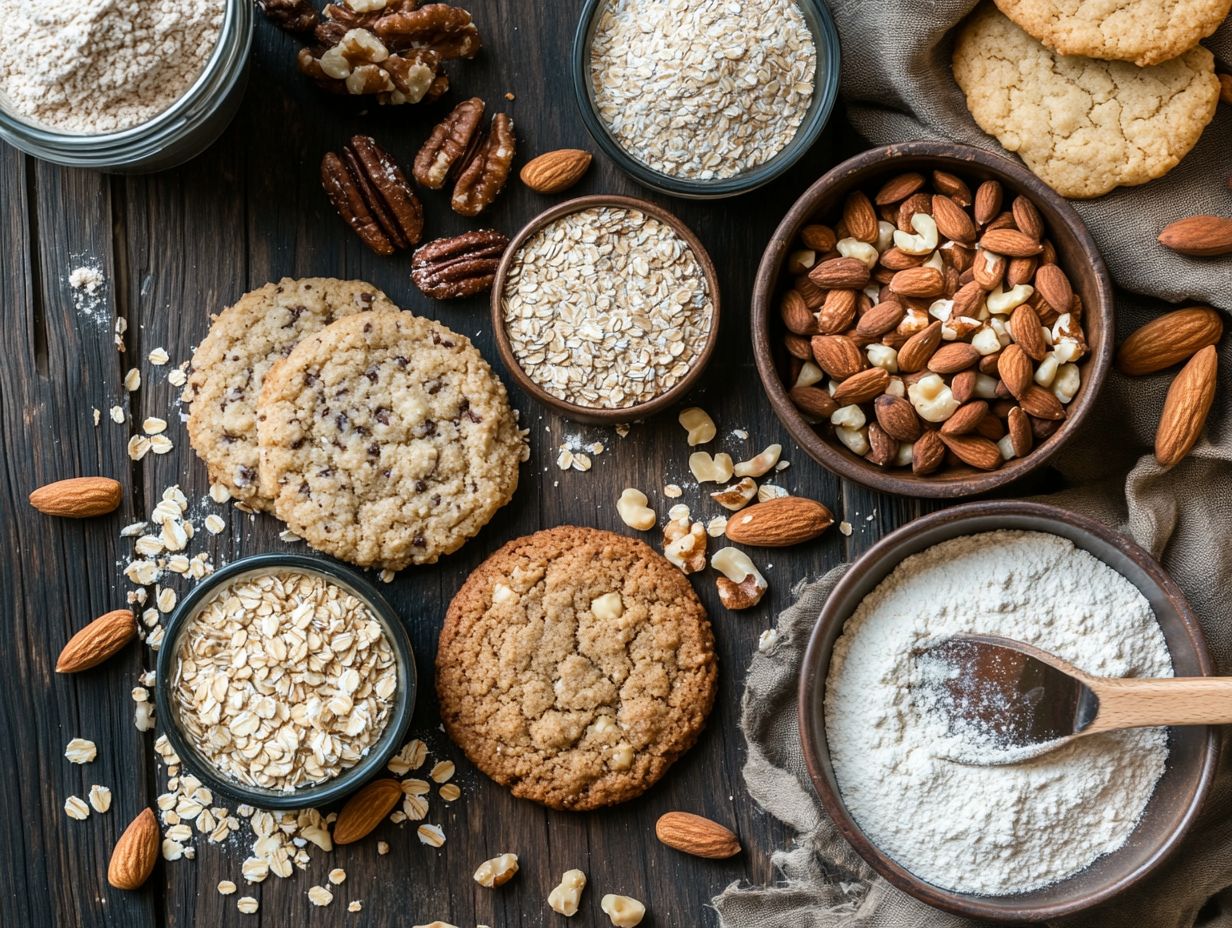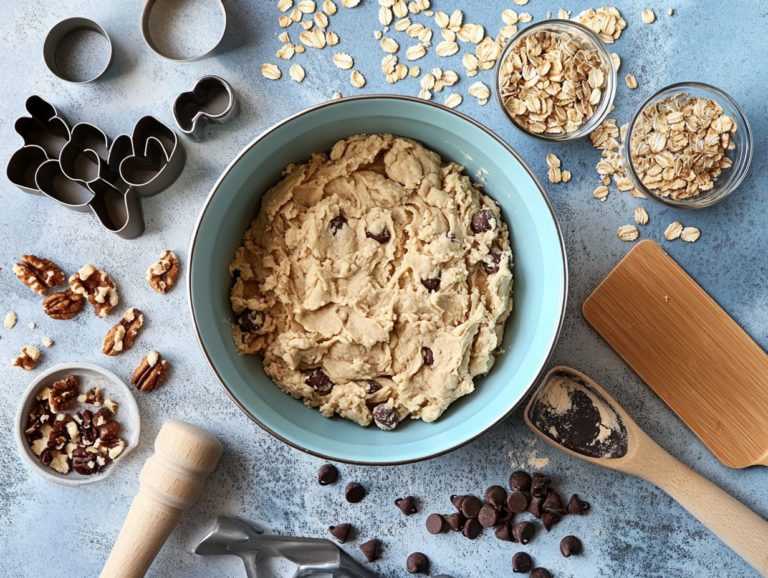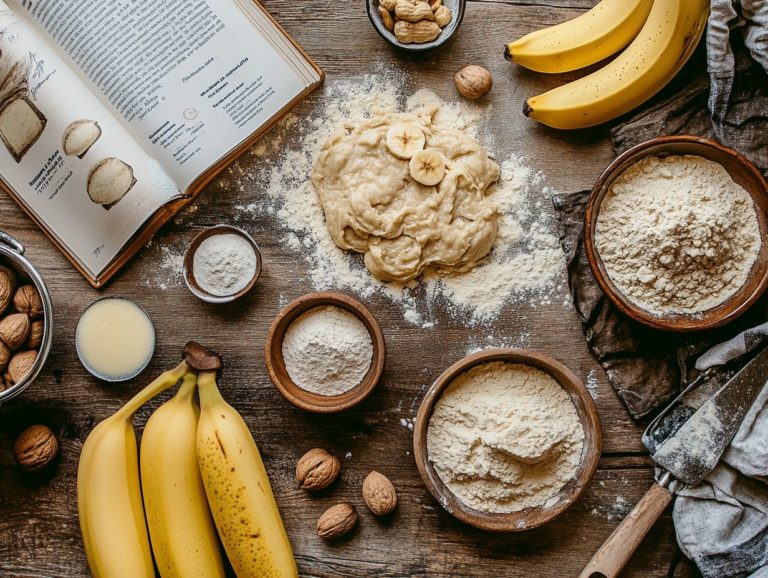Plant-Based Cookies: An Overview of Popular Flours
Contents
- Discover the Joy of Vegan Cookies
- Key Takeaways:
- What Are Plant-Based Cookies?
- What Are the Benefits of Plant-Based Cookies?
- Types of Flours Used in Plant-Based Cookies
- What Types of Flours Are Used in Plant-Based Cookies?
- Popular Flours for Plant-Based Cookies
- 7. Cassava Flour
- 8. Quinoa Flour
- 9. Sorghum Flour
- Frequently Asked Questions
- Are plant-based cookies healthier than traditional cookies?
- Can I use plant-based flours in any cookie recipe?
Discover the Joy of Vegan Cookies
If you find yourself yearning for a delightful sweet treat that aligns with your dietary preferences, vegan cookies may just be the ideal solution. These delectable alternatives cater to both vegans and vegetarians while being brimming with nutrients and fiber, positioning them as a healthier choice.
This article delves into the world of plant-based cookies, uncovering their many benefits and the impressive variety of flours that can be utilized in their creation. There s a delicious option for everyone to savor. You’ll also find useful baking tips to perfect your vegan cookies, from choosing basic ingredients to the right baking temperature and cooling time.
Key Takeaways:
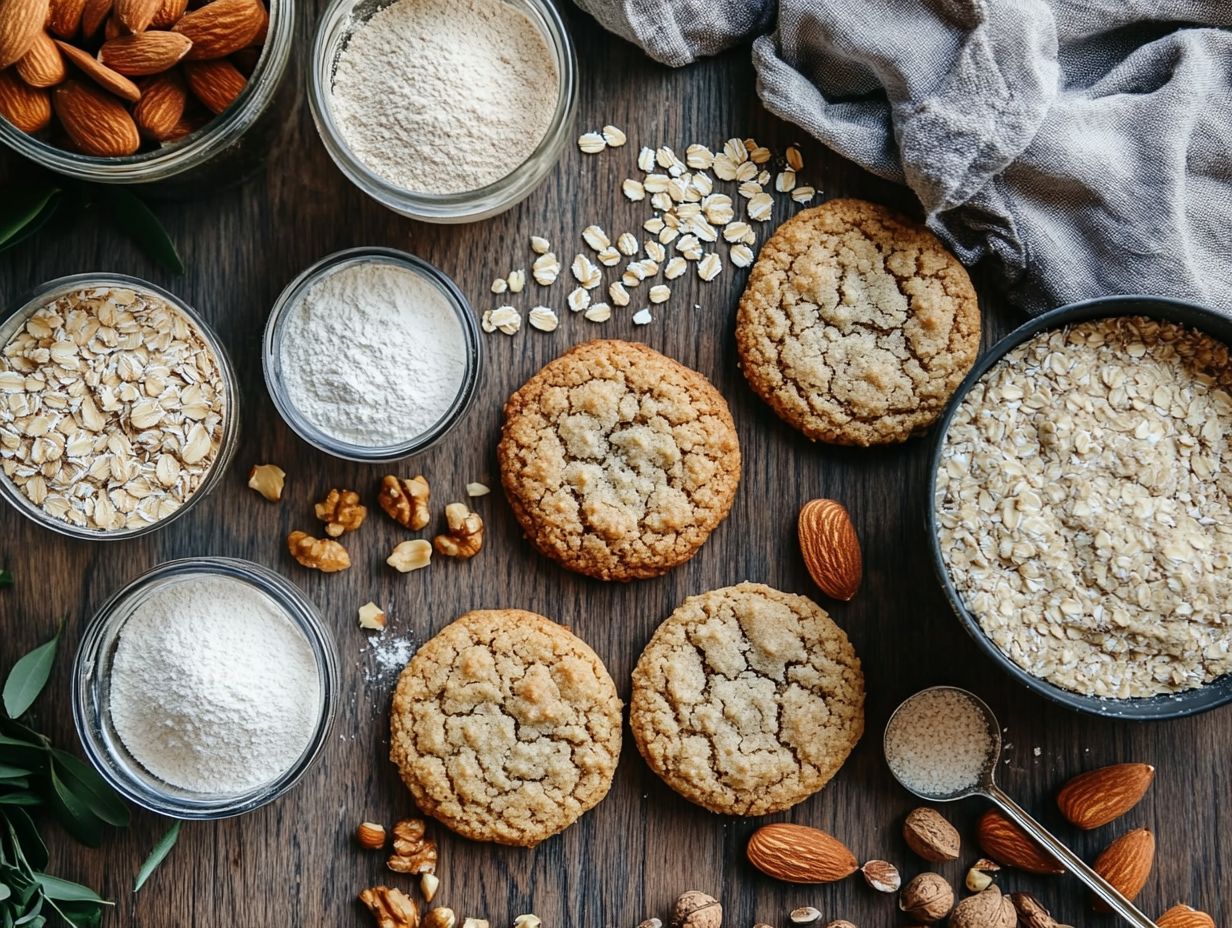
- Plant-based cookies are suitable for vegan and vegetarian diets, making them a versatile and inclusive snack option.
- These cookies made with alternative flours are nutrient-dense and rich in fiber, providing a healthier alternative to traditional cookies. You can find various cookie recipes to suit your preferences.
- From almond to teff flour, there are a variety of plant-based flours that can be used in cookies to accommodate dietary restrictions and preferences.
What Are Plant-Based Cookies?
Plant-based cookies are delightful treats crafted entirely from ingredients sourced from plants. They are a superb choice for anyone in search of vegan options or looking to bake cookies free from animal products. These cookies often blend wholesome elements such as flour and sugars with an array of mix-ins, including chocolate chips, nuts, and dried fruits. This creates an impressive variety of flavors and textures. From classic chocolate chip cookies to adventurous mix-ins, there’s something for every palate.
Whether you lean towards chewy indulgences or crunchy delights, plant-based recipes can accommodate your preferences while ensuring that no animal products are involved. The rise in popularity of plant-based cookies has been remarkable, especially during festive occasions like Christmas. They offer a wonderful alternative to traditional cookies that everyone can enjoy. Consider trying unique recipes like pumpkin spice cookies or Biscoff butter cookies to add festive flair to your celebrations.
What Are the Benefits of Plant-Based Cookies?
Plant-based cookies bring many benefits, making them an exceptional choice for your diet. They are perfect for vegan and vegetarian lifestyles and allow you to indulge in something sweet without sacrificing your values.
These treats can be packed with essential nutrients and fiber thanks to wholesome ingredients like almond flour, oats, and natural sweeteners. This positions them as a healthier alternative to traditional cookies. Trying recipes from sources like The Chestnut Bakery or Vegan Baking 101 can help you discover delicious and nutritious options. They are generally lower in calories and fat, offering a guilt-free dessert option for those mindful of their intake.
1. Suitable for Vegan and Vegetarian Diets
Plant-based cookies are perfectly suited for both vegan and vegetarian diets because they contain no animal-derived ingredients. This inclusivity means you can indulge in a delightful treat that aligns seamlessly with your lifestyle choices. By utilizing simple ingredients like flour, plant milk, and natural sweeteners, you can whip up delicious cookies without compromising on taste or texture. For instance, a basic sugar cookie recipe can be made vegan-friendly with a few simple swaps.
The wealth of plant-based substitutes at your disposal makes it easy to tailor recipes to suit your unique tastes and dietary needs. Using tools like a digital scale for precise measurements can enhance your baking results. Ingredients such as almond flour, coconut oil, and nut butters elevate the flavor profile while introducing healthy fats and protein into your diet. Don’t forget to check for affiliate links to find these ingredients easily on platforms like Amazon.
In terms of sweetening, options like maple syrup and agave nectar offer a lower glycemic index, making them ideal for those mindful of their sugar intake. Experimenting with different flavors by adding spices or extracts to your cookie dough can lead to delightful new creations.
This commitment to wholesome, plant-derived components satisfies your cookie cravings while fostering a healthier lifestyle overall.
2. Nutrient-Rich Cookies
One of the standout advantages of plant-based cookies lies in their impressive potential for delivering nutrients and fiber. By incorporating whole food ingredients like oats, almond flour, and legumes, these cookies not only satisfy your sweet cravings but are also filled with important vitamins and minerals.
Adding ingredients such as flaxseeds or chia seeds can further elevate the fiber content, supporting better digestion and overall health. These nutrient-dense components are brimming with healthy fats, antioxidants, and complex carbohydrates, making them far more nutritious than their traditional counterparts.
For example, oats are celebrated for their heart-healthy beta-glucans, known to help lower cholesterol levels. Meanwhile, almond flour serves as a gluten-free option rich in vitamin E and magnesium. Including ingredients like flaxseeds can enhance the nutritional profile of your cookies.
Choosing natural sweeteners, such as maple syrup or date paste, improves the cookies’ nutritional profile by providing lower glycemic index alternatives, which measure how quickly foods raise blood sugar levels. Using a baking tray lined with parchment paper ensures even baking and easy cleanup. Indulge without guilt and feel great about your choices! By opting for plant-based cookies, you are promoting your well-being while perfectly aligning with a health-conscious lifestyle.
3. Lower in Calories and Fat
Many plant-based cookies offer a delightful advantage: they tend to be lower in calories and fat compared to their traditional counterparts, making them an excellent choice for health-conscious consumers like you. Whether you prefer chewy cookies or crunchy cookies, there’s a plant-based recipe that fits your needs.
By swapping out ingredients like whipped butter for healthier alternatives, such as vegan spreads like Earth Balance or even using mashed bananas as a natural sweetener, you can create delicious cookies that sidestep the extra calories and unhealthy fats. This means you can indulge in your favorite treats without a hint of guilt.
For the best results, pay attention to the resting time and baking temperature specified in your recipe. When you choose almond flour over regular flour, you not only elevate the nutritional profile but also introduce a charming nuttiness that enhances your cookies.
Incorporating unsweetened applesauce in place of oil or butter significantly reduces fat content while ensuring those cookies remain delightfully moist. Opting for natural sweeteners like maple syrup or agave nectar instead of refined sugars helps lower the glycemic index, making these cookies a heart-friendly option. Utilize a wooden spoon and mixing bowl for easy and efficient cookie dough preparation.
With these simple ingredient swaps, you can truly savor a delectable dessert that aligns beautifully with your health goals.
4. Can Accommodate Dietary Restrictions
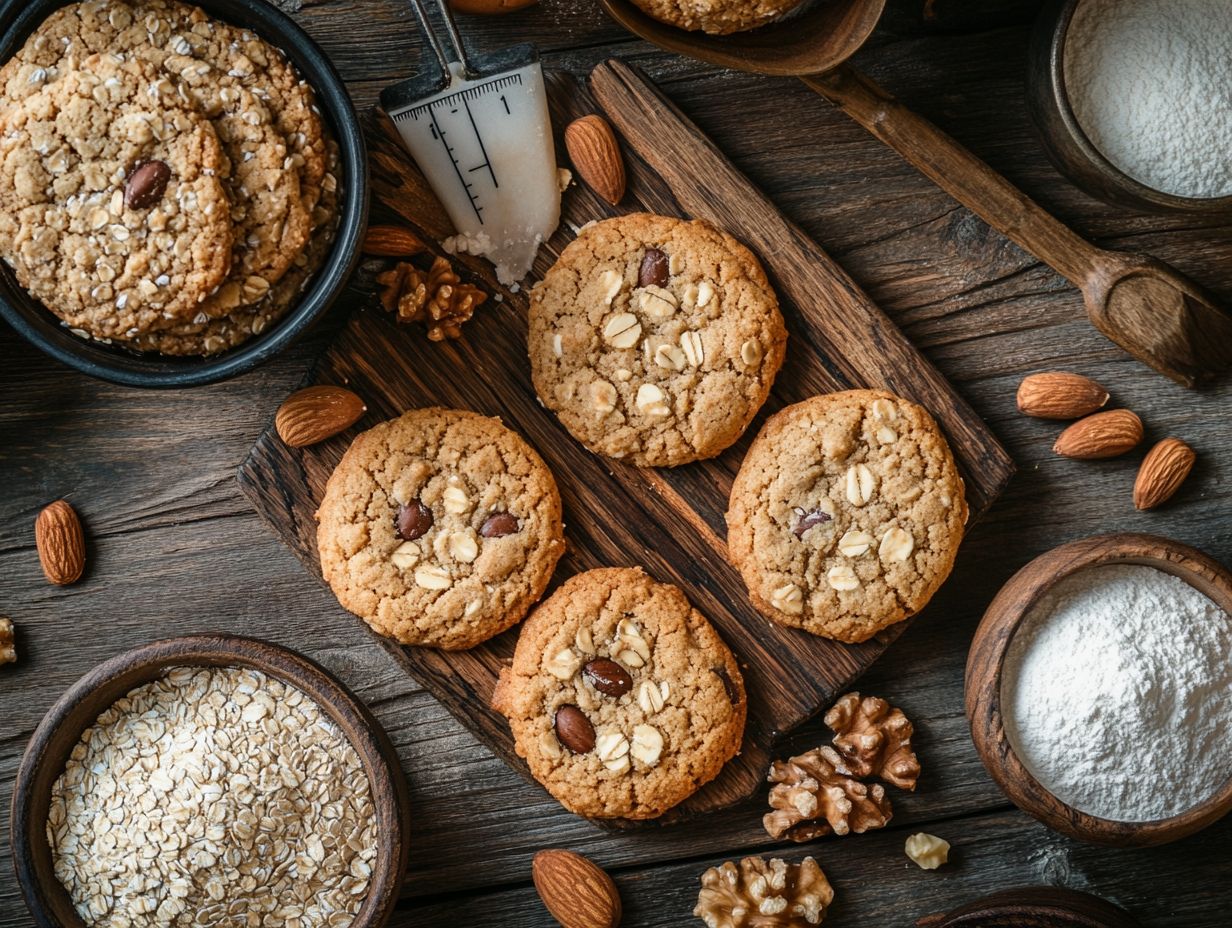
One of the remarkable aspects of plant-based cookies is their ability to accommodate a variety of dietary restrictions, including gluten-free and nut-free options. By choosing suitable flour alternatives like rice flour or chickpea flour and incorporating natural sweeteners, you can create cookies that cater to specific allergies or intolerances. This adaptability positions plant-based cookies as an inclusive dessert option for any gathering.
Incorporating ingredients such as oats, which are naturally gluten-free when certified, enhances the texture without compromising flavor. If you’re avoiding nuts, substituting with seeds like sunflower or pumpkin seeds not only adds a delightful crunch but also boosts the nutritional profile.
The versatility of plant-based baking invites your creativity, allowing you to experiment with fruits, spices, and non-dairy chocolate chips. Consider adding mix-ins like sunflower seeds or pumpkin seeds for added crunch and nutrition. These additions not only enrich the taste but also make each cookie a unique delight.
With such a wide array of options available, it s clear why plant-based cookies can be enjoyed by everyone, regardless of their dietary needs. For more inspiration, explore delicious cookie recipes at The Chestnut Bakery or Vegan Baking 101 and start baking today!
Types of Flours Used in Plant-Based Cookies
What Types of Flours Are Used in Plant-Based Cookies?
When baking plant-based cookies, selecting the right flour is essential because it greatly influences both texture and flavor. You have a variety of flours at your disposal, and each one offers unique benefits and characteristics.
For instance, almond flour adds a delightful nutty flavor and a wonderfully moist texture. On the other hand, coconut flour stands out as a fiber-rich, gluten-free alternative. By experimenting with a combination of these flours, you can achieve the ideal balance for cookies that are chewy or crunchy. Using a digital scale to measure your ingredients accurately can help you achieve precise results.
1. Almond Flour
Almond flour is a favored ingredient in plant-based baking. It adds a rich, nutty flavor and a delightful moist texture to your cookies. It s perfect for anyone with gluten sensitivities and is packed with healthy fats and protein. This makes it a nutritious choice for various cookie recipes.
When using almond flour, consider pairing it with other gluten-free flours to achieve the perfect texture. Incorporating almond flour into your cookies elevates their taste and enhances their nutritional profile, adding fiber, vitamins, and minerals that support overall health.
Almond flour is an ideal substitute, not just for its flavor but also for its impressive ability to create chewy, satisfying baked goods. Ensure your cookie dough is well-mixed using a wooden spoon or a stand mixer. The higher fat content of almond flour contributes to a moistness that shines in recipes with fewer wet ingredients.
Explore the versatility of almond flour by combining it with oats or coconut flour. This enhances both taste and texture while preserving that gluten-free quality many people appreciate. This ultimate guide to plant-based flours will help you find the best combinations for your baking needs.
2. Coconut Flour
Coconut flour is another fantastic option for plant-based cookies, offering a light and fluffy texture. It works particularly well in recipes that require a lot of moisture, as it absorbs liquids effectively. Combine it with other flours like almond flour to achieve the perfect consistency.
When using coconut flour, remember to adjust the baking temperature and cooling time to ensure even baking. For the best results, let the cookie dough rest before baking to allow the flour to fully hydrate.
Coconut flour is celebrated for its high fiber content and distinctive flavor profile. As a gluten-free option, it introduces a delightful sweetness along with a subtle hint of coconut to your cookie recipes. However, keep in mind that coconut flour absorbs more moisture than traditional flours, so you ll likely need to adjust your liquid ingredients to achieve that perfect cookie dough consistency.
By incorporating coconut flour, you not only elevate the texture and taste of your cookies but also gain a host of nutritional benefits, including healthy fats and a lower glycemic index meaning it won’t spike your blood sugar as much as regular flour would.
As you explore this versatile ingredient, remember that a little goes a long way. Typically, substituting one-fourth to one-third of the regular flour with coconut flour is quite effective.
To ensure a moist and flavorful outcome, consider increasing the liquid or egg content in your recipe. This adjustment will help maintain the desired softness and chewiness in your final product. With these simple tweaks, you can create delicious, nutritious cookies that are satisfying and a healthier choice for anyone embracing a plant-based lifestyle. Don t miss out on the chance to make these delicious cookies!
Popular Flours for Plant-Based Cookies
3. Oat Flour
Oat flour is an exceptional and versatile choice for crafting plant-based cookies. It brings a gentle flavor and hearty texture to your baked goods. By opting for certified gluten-free oats, you ensure that your creations are gluten-free, catering to those with gluten intolerances. This flour adds a delightful chewiness to your cookies and harmonizes beautifully with a variety of mix-ins, such as chocolate chips or dried fruits.
With its impressive fiber content, oat flour supports better digestion and helps you whip up treats that are satisfying and filling. In your cookie recipes, it enhances the overall flavor profile without overshadowing other ingredients, allowing spices like cinnamon or nutmeg to truly shine.
Thanks to its natural sweetness, oat flour can help cut down on the need for additional sugars, making it a fantastic option for healthier baking. Whether you’re whipping up a classic batch of oatmeal cookies or experimenting with exciting new combinations, incorporating oat flour into your recipes opens up a world of delectable and nutritious plant-based possibilities.
4. Chickpea Flour
Chickpea flour is a protein-rich alternative that can elevate your plant-based cookie game. It introduces a unique flavor and texture. Crafted from ground chickpeas, this gluten-free flour brings a slightly nutty taste to your baked delights. When paired with sweeter ingredients, chickpea flour creates a well-balanced cookie that tantalizes your taste buds while nourishing your body.
Beyond its delightful flavor profile, the high protein content of chickpea flour makes it an excellent choice for anyone seeking to enhance their dietary intake. This flour harmonizes beautifully with others, like almond or whole wheat, allowing you to diversify both the health benefits and the overall taste of your treats.
By blending chickpea flour with different flours, you unlock a more complex flavor, enhancing sweetness from ingredients like honey or maple syrup while ensuring each bite is packed with essential nutrients. This versatility results in a delicious end product and encourages healthier baking options that cater to various dietary needs.
5. Buckwheat Flour
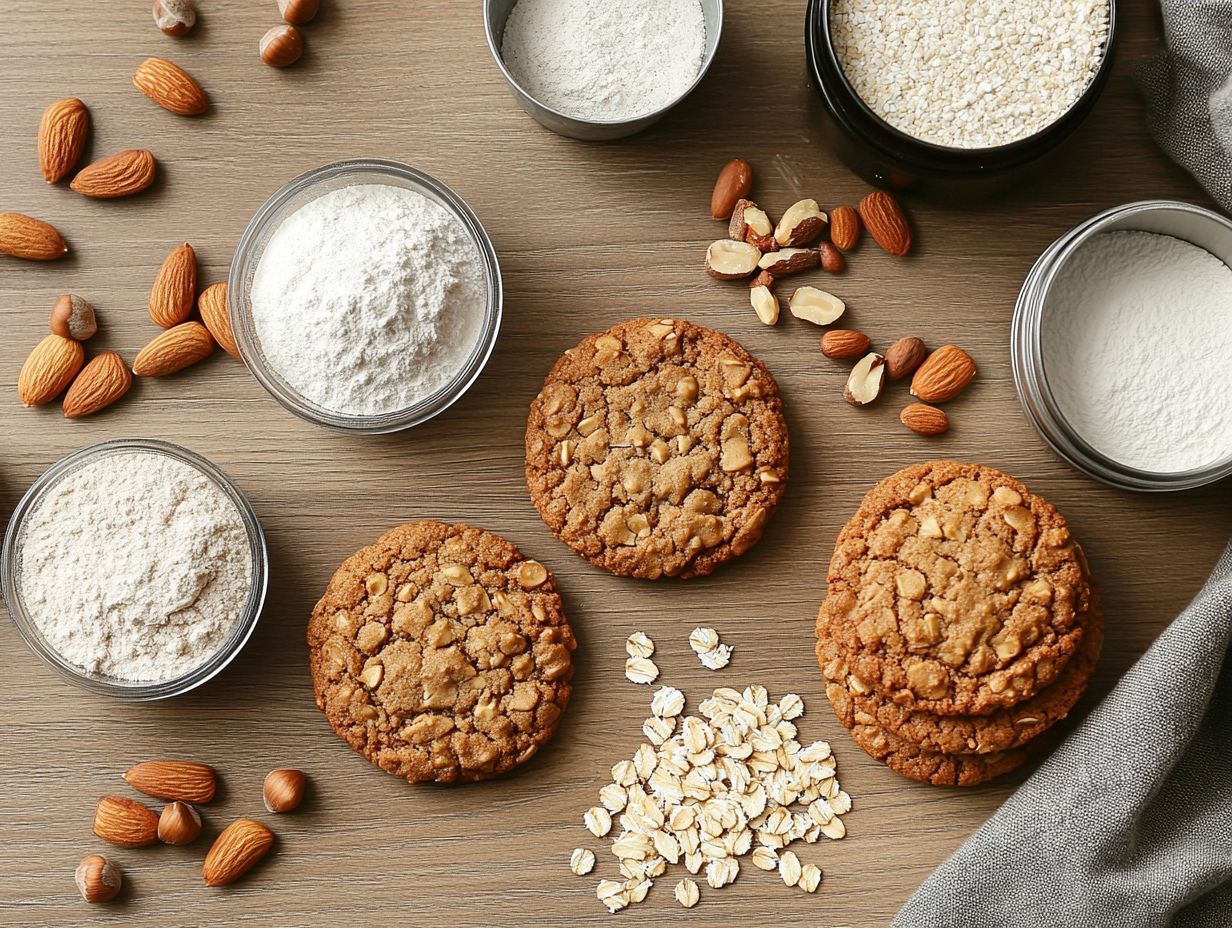
Buckwheat flour presents a distinctive gluten-free option that infuses your plant-based cookies with hearty flavor and rich color. Despite the name, buckwheat isn’t derived from wheat; it’s actually a seed packed with protein and essential nutrients. Incorporating buckwheat flour into your cookies adds a unique taste and texture. It entices those looking for something different.
This exceptional ingredient features a delightful nutty flavor profile that elevates your baked goods to new heights. Unlike conventional flours, it brings a remarkable textural quality that enhances the entire eating experience. If you have gluten sensitivities, you can indulge without worry, as buckwheat flour is entirely gluten-free making it a safe choice for your diet.
Its high antioxidant and fiber content contributes to its health benefits, promoting better digestion and overall well-being. By incorporating buckwheat flour into your recipes, you embrace a nutritious alternative that fosters a balanced lifestyle.
6. Rice Flour
Rice flour is your go-to for gluten-free baking, making it a superb choice for crafting plant-based cookies. Enjoy a light texture and a subtle flavor that allows your other ingredients to truly shine. Plus, it s readily available, and mixing it with other flours can elevate both the texture and taste of your cookies while keeping them entirely plant-based.
Beyond its neutral profile, rice flour boasts a variety of health benefits, being rich in essential nutrients and low in fat perfect for those who prioritize wellness in their baking endeavors. When paired with ingredients like almond flour or coconut flour, it creates a delightful combination that enhances moisture while maintaining the structural integrity of your baked goods.
This versatility allows rice flour to shine not just in cookies but also in cakes, muffins, and pancakes, enriching your plant-based diet with delicious and satisfying gluten-free options.
7. Cassava Flour
Cassava flour, sourced from the cassava root, stands out as a versatile gluten-free option for your plant-based cookie creations. Its neutral flavor and fine texture work harmoniously. This creates that tender crumb you desire.
Because it mimics the properties of wheat flour, you can integrate cassava flour into various baking applications without sacrificing the plant-based essence of your cookies. Not only does cassava flour help deliver a moist and soft texture, but it also offers a fantastic source of carbohydrates, providing an energy boost for those following a plant-based lifestyle.
You ll find that bakers often laud this flour for enhancing overall crumb structure, resulting in cookies that are delightfully light yet chewy. Dive into exciting flavor profiles with cassava flour! By incorporating it alongside other gluten-free ingredients, you can explore creative combinations while ensuring your final product caters to those with dietary restrictions.
With its minimal impact on taste, cassava flour allows the true essence of your added ingredients like rich chocolate chips or crunchy nuts to truly shine. This makes it an ideal choice for your gluten-free baking endeavors.
8. Quinoa Flour
Quinoa flour is a healthy option with lots of protein that can elevate the health profile of your plant-based cookies. This gluten-free flour not only imparts a subtle nutty flavor but also boosts the nutritional value (the vitamins and minerals that keep you healthy), making your cookies more satisfying. When combined with other flours, quinoa flour helps you achieve a well-balanced texture and flavor in a variety of cookie recipes.
Incorporating this versatile ingredient into your baking routine goes beyond just enhancing taste; it brings a wealth of essential nutrients, including fiber, magnesium, and iron. These nutrients support digestive health and provide energy, transforming each cookie into a guilt-free indulgence.
The unique flavor of quinoa flour pairs beautifully with a range of ingredients, from rich chocolate chips to tangy dried fruits. This allows you to create delightful variations that cater to diverse palates. This innovative approach to healthy baking not only tantalizes the taste buds but also ensures your cookies maintain their wholesome integrity without compromising on flavor.
9. Sorghum Flour
Sorghum flour may not be the most famous gluten-free option, but it s truly a gem that can introduce a mild sweetness and rich texture to your plant-based cookies. Its unique properties make it a stellar choice for those with gluten sensitivities, blending seamlessly with other flours to enhance flavor profiles.
When you incorporate sorghum flour, you open the door to creating deliciously unique cookie recipes that cater to a variety of tastes. This versatile flour not only boosts the nutritional value of your cookies with a commendable supply of fiber and protein but it also guarantees a delightful flavor experience that sets your baked goods apart from traditional wheat-based treats.
The subtle nutty undertones and slightly sweet hints of sorghum flour work in perfect harmony with ingredients like chocolate chips, nuts, and spices. This makes it an ideal choice for crafting an impressive array of cookie types, from the classic chocolate chip to a comforting spiced oatmeal.
By experimenting with sorghum flour in your baking, you can explore innovative flavors while reaping the benefits of a gluten-free lifestyle.
10. Teff Flour
Teff flour, derived from the tiny grains of the teff plant, presents an exceptional gluten-free option for your plant-based cookies. Renowned for its earthy flavor and impressive nutritional profile, teff flour is rich in protein, fiber, and essential nutrients. Its distinctive flavor can add intriguing depth to your vegan cookies and cookie recipes, making it an appealing choice for anyone seeking a wholesome and delightful treat.
Incorporating teff flour into your baking not only enhances the flavor but also brings a multitude of health benefits. Loaded with iron, calcium, and potassium, it can significantly contribute to a balanced diet, particularly for those embracing plant-based lifestyles. The nutty undertones of teff harmonize beautifully with chocolate, fruit, and mix-ins like chocolate chips, positioning it as a versatile ingredient for any cookie enthusiast.
By choosing teff flour, you’re not merely opting for a gluten-free alternative; you’re elevating your baked goods with a nutritional boost while relishing the satisfaction of creating a deliciously unique dessert, whether it’s for Christmas or any special occasion.
Frequently Asked Questions
What is Vegan Baking 101?
Vegan Baking 101 covers all the essential tips and knowledge for baking delicious vegan cookies and other treats.
Plant-based cookies, also known as vegan cookies, are cookies that are made without the use of any animal products, such as eggs, dairy, or butter. Instead, they are made with ingredients derived from plants, such as flours, oils, and sweeteners.
Plant-based cookies are cookies that are made without the use of any animal products, such as eggs, dairy, or butter. Instead, they are made with ingredients derived from plants, such as flours, oils, and sweeteners. Some favorite recipes include Biscoff butter cookies and pumpkin spice cookies.
Plant-based flours offer a variety of benefits, such as being gluten-free, high in nutrients, and lower in calories. They also add unique flavors and textures to cookies, making them a healthier and more diverse option. For instance, The Chestnut Bakery highlights these benefits extensively.
Plant-based flours offer a variety of benefits, such as being gluten-free, high in nutrients, and lower in calories. They also add unique flavors and textures to cookies, making them a healthier and more diverse option. Try using a wooden spoon and mixing bowl for a traditional touch or opt for a vegan spread like Earth Balance for a rich flavor.
Some popular plant-based flours used in cookies include almond flour, coconut flour, oat flour, buckwheat flour, and chickpea flour. These flours offer different textures and flavors, making them versatile for various types of cookies, including chewy cookies and crunchy cookies.
Some popular plant-based flours used in cookies include almond flour, coconut flour, oat flour, buckwheat flour, and chickpea flour. These flours offer different textures and flavors, making them versatile for various types of cookies. For instance, almond flour can be used to create perfect vegan sugar cookies or chewy cookies, while oat flour is great for crunchy cookies. To explore more about these ingredients, check out the ultimate guide to plant-based cookie ingredients.
Yes, plant-based cookies made with alternative flours can be a good option for people with food allergies or dietary restrictions. They are free from common allergens like wheat, dairy, and eggs, making them a safe and delicious option. However, always check ingredient labels to ensure they meet specific allergy needs.
Yes, plant-based cookies made with alternative flours can be a good option for people with food allergies or dietary restrictions. They are free from common allergens like wheat, dairy, and eggs, making them a safe and delicious option. You can even find vegan baking ingredients on Amazon to make your shopping easier.
In many cases, plant-based cookies can be a healthier option than traditional cookies. They are often lower in calories, sugar, and fat, and may contain more nutrients due to the use of whole food ingredients. Brands like Earth Balance offer vegan spreads that can be a healthier alternative to traditional butter. Remember to follow the correct baking tips, such as using the appropriate baking tray, and consider the resting time for the dough for the best results.
While plant-based flours can be used in many cookie recipes, it s important to note that they may not always give the same results as traditional flours. You might need to experiment a bit to find your perfect cookie texture! For example, try using a kitchen scale for precise measurements and consider factors like baking temperature and cooling time.
Using plant-based flours may require some adjustments to get the desired texture and taste in your cookies. For instance, using whipped butter or melted butter substitutes can affect the consistency of your cookie dough. Monitor the baking temperature closely to achieve the perfect bake.
Start your plant-based baking journey today!

